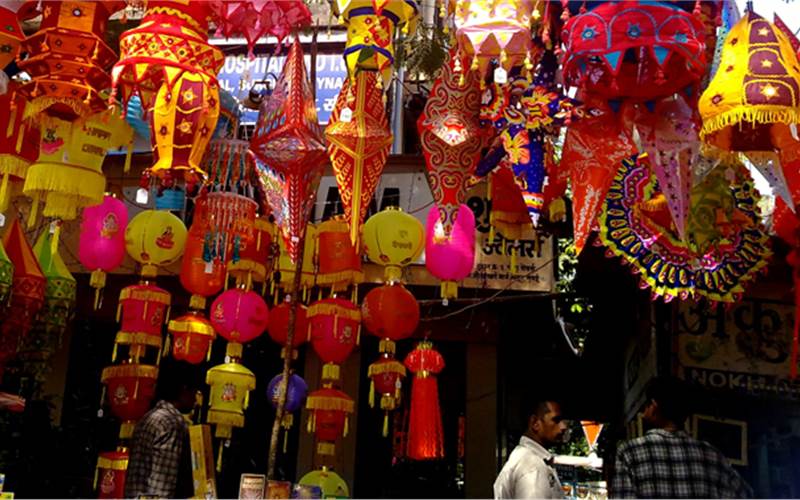Non-clarity about GST impacts print trade during Diwali season
The animal spirits are not churning. Diwali has been slow. The market sentiments in Mumbai and Delhi is bearish – this becomes clear in one of Mumbai’s busiest industry galas like Shah and Nahar and A to Z.
The silence is deafening.
18 Oct 2017 | By PrintWeek India
The animal spirits are not churning. Diwali has been slow. The market sentiments in Mumbai and Delhi is bearish – this becomes clear in one of Mumbai’s busiest industry galas like Shah and Nahar and A to Z. The silence is deafening.
Even a tiny item like paper kandeels (light lanterns) has been impacted. Of course, this can be attributed to the freak rains. This means kandeels cannot be sold on the pavements or displayed outside the house because of the rain. But even the wedding card and stationery market in Girangaon and Chawri Bazaar, home to countless small units, is doom and gloom. The Diwali buzz is missing, and shopkeepers who were previously busy, especially in festival times, gaze at the entrance of their shops.
At the other end of the spectrum, dual HSN codes for paper or paperboard and other similar items under GST have caused chaos. A packaging firm CEO in Pune said, "These have to be entered separately in the systems to avail of the tax credits. Globally, the input credit system is simpler and less onerous. One standard rate is the norm internationally instead of having as many as five tax slabs from zero to 28 per cent."
Industry trackers say the unbranded and smaller players have been worst hit. Especially with provisions like invoice matching, under which "a purchaser cannot claim input credit unless the supplier’s invoice details match the former’s invoice uploaded on the GST portal which is struggling to keep pace."
A consumable-traders said, "How can there be a risk-taking appetite among businessmen in our industry if we are busy with filing our GST. I have a dealer presence in seven states. That means seven returns. Shall I develop our business or file returns while there are glitches in the GST Network?". He added, "The law makers can modify the GST law on a weekly basis but a small time trader cannot amend his incorrectly filed 3B. I am promptly threatened with a penalty. Why?"
It is a legitimate question.
There is a broad consensus, that the past 12 months have been difficult due to de-monetisation and GST.
But there is hope.
Raju Suneja, director, Sona Signature Papers says, "Print publishing has been pegged at a growth rate of 6.8% pa. Packaging and digital has seen a double digit growth rate of 17% pa and 15% pa respectively. This is a trend that we see will drive this industry."
Most industry leaders, PrintWeek India spoke to concurred, "GST is good for the industry as that would put everything on a common perspective. Already the removal of the C-Form is seeing the ease of business."
Plus the Central Government appears keen to "sort out the mess."
An All India Federation of Master Printers member told PrintWeek India, "We had a meeting with the Revenue Secy Hasmukh Adhia. He heard our apprehensions about the non-clarity of the GST system." Adhia mentioned items in the 28% GST rate slab would be brought down plus there shall be a rationalisation of the slabs. Above all, the revenue secretary said he would look into the industry demand about its status. Is print and packaging, service or manufacturing?".
Meanwhile, more than 50-60 publishers of Maharashtra's famous Diwali Anks series which has cult Marathi readership have been unable to print copies this year. In 2016, 150 Diwali Anks were printed and published. This year, the number is 90-100 Diwali Anks. There is a dip in advertising revenue. The brands are hedging their bets and "advertising only in the established Anks". National banks, manufacturing units and SME business firms have not opted for ads in 2017.
The same trend is visible among magazines and newspapers.
Advocate Shailesh Sheth spoke at the BMPA's AGM. He quoted Hugh MacLennan: “Man is a thinking animal, a talking animal, a tool-making animal, a building animal, a political animal. But in the twilight of a civilisation, he is chiefly a tax-paying animal.”
Sheth added, “With GST, that fundamentally changes the indirect tax structure for our country, the business cannot be the same as before. We have crossed the point of no return.”
But as a publisher said the government is trying to make this a battle of compliance versus non compliance. That's not ethical. The publisher added: "Guess we are still caught up trying to understand what rate the print firms are going to charge us at (even the printers don't seem to know for sure), how much work will be involved in filing regular returns (if we are interested in claiming input credits), or how much we will lose if (those of us below the mandatory level) choose to forgo the input credits."
The publisher concluded: "In the meanwhile, would it not make sense to also point to how unhelpful it is to place pressures on Indian publishing given its potential to become a real world leader? Or that a rather heavy tax on books (or even the printing of books) is indeed a tax on knowledge. Or that the tax on ebooks makes little or no sense since this is a technology of the future, and we are struggling to sell ebooks in this part of the world anyway?."
The GST Council met in the pre-Diwali season and exempted 154 common items in the list and defer the implementation of the e-way bill. Has it been helpful for our industry? Only time shall tell.
Till such time, the data capture indicates order cuts and cash crunch. This is all because of GST, say major traders to PrintWeek India. Most firms have braced themselves for a reduced business of "almost 50% this Diwali season!"













 See All
See All